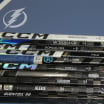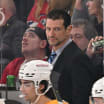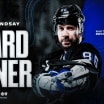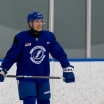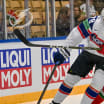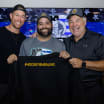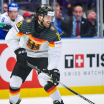Here in the Tampa Bay area, radio station 620 WDAE has begun rebroadcasting Lightning playoff victories from recent seasons. They've started with the team's 2015 postseason run. This week, they've been airing the four wins from the Lightning's first-round series triumph over Detroit, a hard-fought matchup that went seven games. The Lightning's Game Two victory aired last Sunday. Their Game Four win was Tuesday. Tonight (Thursday) is Game Six. Game Seven will be Saturday night.
Mishkin's Musings: The 2015 Lightning-Red Wings playoff series
Radio broadcaster Dave Mishkin takes a look back at Tampa Bay's dramatic series win over Detroit in the 2015 playoffs
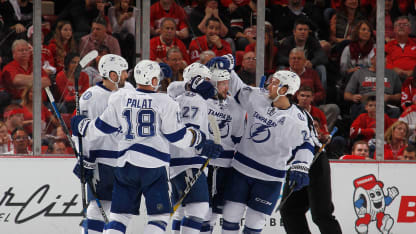
© Gregory Shamus/Getty Images
By
Dave Mishkin
TampaBayLightning.com
On Wednesday, I recorded an interview with Greg Linnelli that will air during the pregame of tonight's broadcast. We reminisced about Game Six specifically and the series as a whole. The conversation brought back plenty of memories.
The Lightning and Red Wings finished second and third, respectively, in the Atlantic Division and therefore met in what was their first-ever playoff matchup. It was the second consecutive postseason appearance for the Lightning. In 2013-14, they had surprised many in the hockey world with a second place finish in the division. With so many players entering their first-ever NHL playoff series, however, the Lightning were overmatched in a four-game sweep against Montreal. (Having to play that series without an injured Ben Bishop didn't help their cause either). The quick exit from the postseason stung, but disappointment was tempered by the expectation that the Lightning would learn from that experience - and be better because of it. The Red Wings, by comparison, were no strangers to the playoffs. They were still enjoying a consecutive postseason appearance streak that had started in 1990-91. But while they were still a strong team, the Wings had been trending down in recent seasons. They won the Stanley Cup in 2008 and made the Final in 2009. Since then, they had not made it past the second round. And prior to their matchup against the Lightning, they had won only one series in the previous three seasons.
So given that backdrop, most pundits picked the Lightning to "take the next step" and move onto the second round.
Against the Canadiens in that 2014 matchup, the Lightning hadn't played to their high standard. Conversely, during the first two games against Detroit - both of which took place in Tampa - the Lightning delivered two strong performances. Unfortunately for them, they only won one of them. In Game One, the Lightning outshot the Red Wings, 46-14, but lost, 3-2. Detroit goalie Petr Mrazek, with 44 saves, was a big factor. So too was the fact that the Wings never trailed. An early second period power play goal gave the Wings a 2-1 lead. They would extend it early in the third with a tally that turned out to be the game-winner. Two nights later, however, the script was flipped. Tyler Johnson's first period goal allowed the Lightning to play with the lead. They added three more in the second period (including another Johnson goal) and cruised to a 5-1 win.
With the series moving to Detroit for Games Three and Four, the Lightning certainly would have preferred to have been up 2-0. Still, they also knew they had outplayed their opponent through the first two games. But the dynamic of the series was about to take a drastic turn.
There were two days off between Games Two and Three. Perhaps an extra day of preparation for Detroit made a big difference. Or the Wings needed a couple of games to settle into their own rhythm. Whatever the reason, as Game Three got underway, it was clear that the Red Wings were a different team than the one that the Lightning had seen in the first two contests. Detroit effectively utilized a tight, suffocating defensive structure. The time and space that had been so plentiful for the Lightning earlier in the series disappeared. The Red Wings were overwhelmingly successful in limiting any potential Lightning scoring chances. And while the Wings weren't necessarily applying relentless o-zone pressure themselves, they did generate enough offense to complement their stout team defense. Detroit won Game Three, 3-0, and held the Lightning to just 22 shots.
Game Four featured one of the most dramatic comebacks in Lightning history. But that drama occurred late in the game. Prior to the final minutes, much of Game Four looked exactly like Game Three. The Wings chipped in a couple of second period goals to build a 2-0 lead. As in Game Three, they clamped down defensively, so the Lightning had trouble generating good looks. With less than six minutes left in the third period, the Lightning, still down by two goals and seemingly unable to crack Detroit's defensive structure, were staring at a potential 3-1 series deficit. Then, in the blink of an eye, everything changed. Detroit center Luke Glendening had been especially effective matching up against Johnson (and his "Triplet" linemates Ondrej Palat and Nikita Kucherov). But with just under seven and a half minutes left in the game, Glendening and Victor Hedman were involved in a post-whistle altercation. They each received minor penalties, creating a four-on-four situation and more room on the ice. Just as significantly, with Glendening in the box, the Wings couldn't match him against Johnson. With time winding down on the four-on-four, Johnson sped down the wing past a couple of Detroit defenders and tucked a puck into the top of the net. Suddenly, with 5:26 left, the Lightning were within a goal. Just over a minute after scoring, Johnson again attacked the Wings off the rush. He took the puck towards the right corner and fed Palat in front for the tying goal. The two tallies galvanized the Lightning and stunned the Wings, who momentarily lost some of their tight structure. Compounding matters for the home team, Glendening sustained an injury before regulation ended and had to receive treatment in the Detroit locker room. Word was that Glendening was getting ready to return just as Hedman and Johnson converted on a two-on-one rush (following a Detroit neutral zone turnover) at 2:25 of overtime to give the Lightning a stunning comeback win.
If the Lightning thought that the Game Four triumph would provide them with a boost when they returned home for Game Five, they would be disavowed of that notion. Abruptly. Game Five, frankly, unfolded very much like Game Three and most of Game Four. The Wings defended brilliantly, got the lead, and never relinquished it. This was a 4-0 shutout that left Lightning fans wondering if the team would even get to play another home game that season.
In my opinion, Game Six against Detroit is one of the most important games in the history of the franchise. The Lightning were teetering on the brink of another first round playoff exit. But unlike the '14 playoffs, this was no longer a new experience for much of their group. It would have been a more devastating defeat. Plus, the Lightning entered Game Six still flummoxed by their inability to break down Detroit's tight structure. Outside of an eight-minute span at the end of Game Four, the Wings had played flawless defensive hockey for three consecutive games. Just as Detroit had done after Games One and Two, the Lightning had to find a way to change the narrative of the series.
They were able to do it. On the road. In an elimination game. That's why Game Six remains one of my fondest memories from that postseason. If the Wings successfully imposed their defensive "will" on the Lightning in Games Three and Five (and most of Game Four), the Lightning imposed their "will" on the Wings in Game Six. They used their speed to create room, generated scoring chances, and, perhaps most significantly, got an early lead. In the previous three games, the Wings hadn't had to play from behind (even in Game Four, they never "trailed" - at least until Johnson's OT winner ended things). In Game Six, though, Johnson tallied the opening goal in the early minutes. Jason Garrison added another before the first period ended. And early in the middle stanza, Johnson's second of the game (and sixth in the series) made it 3-0. There were a few anxious moments in the second half of the game. The Wings converted on a five-on-three before the second period ended. A Detroit four-on-four goal early in the third made it 3-2. On the next shift, the Wings received a power play opportunity with a chance to tie. But the Lightning killed it off. With under six minutes left, Alex Killorn provided insurance with a breakaway goal and then, with time winding down, Cedric Paquette iced the win with a shorthanded empty-netter. Despite having to kill eight penalties, the Lightning held the Wings to just 24 shots.
Game Six was a complete team victory. Game Seven was a Ben Bishop win. In many ways, Game Seven was Detroit's most complete performance in the series. Not only did the Wings play another solid defensive game, they were also at their most dangerous offensively. They fired 31 shots on net, a high for them in the series. They generated numerous scoring chances, particularly in the first two periods when the game was still scoreless. But because of Bishop's goaltending, the Lightning never had to play from behind. Then, with the third period almost four minutes old, Ryan Callahan set up Braydon Coburn for a one-timer at the top of the right circle. Coburn's end-over-end shot fluttered over Mrazek's stick into the top of the net. The Wings pressed down the stretch, but Bishop knocked away every shot. I recall one in particular on Henrik Zetterberg during a third period four-on-four that was especially tough. Anton Stralman's empty-netter with just over a minute left sealed the victory, both in the game and in the series.
In the 2015 postseason, the Lightning played four series. Each posed its own challenges, both in terms of how the series unfolded and the strengths of the opposition. It was against Detroit that the Lightning saw their most structured opponent. It's true that Chicago stymied the Lightning in Games Five and Six of the Final, but the Wings played outstanding D for much, if not all, of Games Three, Four, Five, and Seven. Due to Mrazek's Game One performance, the Lightning needed victories in two of those four contests. They got them, thanks to a comeback for the ages in Game Four and Bishop's heroics in Game Seven.
Most Impressive Win: Game Six
Most Dramatic Win: Game Four
Best Goaltending Performance: Game Seven
Most Comfortable Win: Game Two

